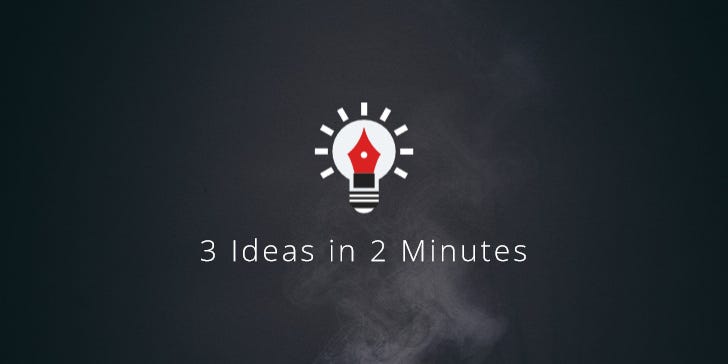#210: Gift of Wrongness, Popper's Falsifiability Principle & Self-Defeating Prophecies
3 Ideas in 2 Minutes on the Gift of Being Wrong
I. Gift of Wrongness
The Gift of Wrongness is a precious one. Just imagine a world in which you can no longer tell facts from fiction. Here’s a fitting quote attributed to German-American historian Hanna Arendt:
This constant lying is not aimed at making the people believe a lie, but at ensuring that no one believes anything anymore.
A people that can no longer distinguish between truth and lies cannot distinguish between right and wrong.
And such a people, deprived of the power to think and judge, is, without knowing and willing it, completely subjected to the rule of lies. With such a people, you can do whatever you want.
—Hannah Arendt (allegedly)
Luckily, we’re still able to declare this popular Hanna Arendt quote as fake. She did say something similar, though:
[T]he result of a consistent and total substitution of lies for factual truth is not that lies will now be accepted as truth, and the truth be defamed as lies, but that the sense by which we take our bearings in the real world — and the category of truth vs. falsehood is among the mental means to this end — is being destroyed.
—Hannah Arendt (actually)
II. Popper's Falsifiability Principle
Popper’s Falsifiability Principle principle says that for a theory to be considered scientific, it must be testable and capable of being proven false. Be it through empirical observation or experiment. It was Austrian-British philosopher Karl Popper who gave the idea its name. Scientific theories, he said, should make predictions that could, in principle, be refuted by evidence. We can also apply this more broadly.
Take the claim, “All swans are white,” for example. It’s a bold claim that can be (and has been) proven false by finding a single Black Swan. The idea that an “invisible dragon is living in my garage,” however, is a claim that cannot be tested or disproven because there is no way to empirically observe or negate it.
On a more personal level, consider Alexander’s Question. If we can’t think of any evidence that would make us change our minds about a belief, we might be holding an unreasonable ideological position. For example by having crafted a sneaky Kafka Trap.
III. Self-Defeating Prophecy
We’ve covered Self-Fulfilling Prophecies, the idea that your expectations help bring about a negative event you predicted. Self-Defeating Prophecies are the polar opposite. They don’t cause the behaviour that makes the prediction with a disastrous outcome a reality. They avert it. In other words, Self-Defeating Prophecies prevent what they predict from happening.
If you’re old enough you may remember the panic around the so-called Y2K millenium bug. As the New Year’s Eve of 1999 approached, people got more and more concerned. They feared computer systems would fail on January 1 2000. Because many older programs used two-digit year formats. Once the year changed from “99” to “00,” systems might interpret it as 1900. Would this cause software crashes, financial disasters and infrastructure failures?
It didn’t. Many people believe disruptions were only avoided because companies and the government took the “prophecy” seriously. They spent billions upgrading and fixing systems. Or was it just a waste of resources? 🐘
Have a great week,
Chris
themindcollection.com


Love it! I really enjoy the mental gymnastics these short excerpts encourage!